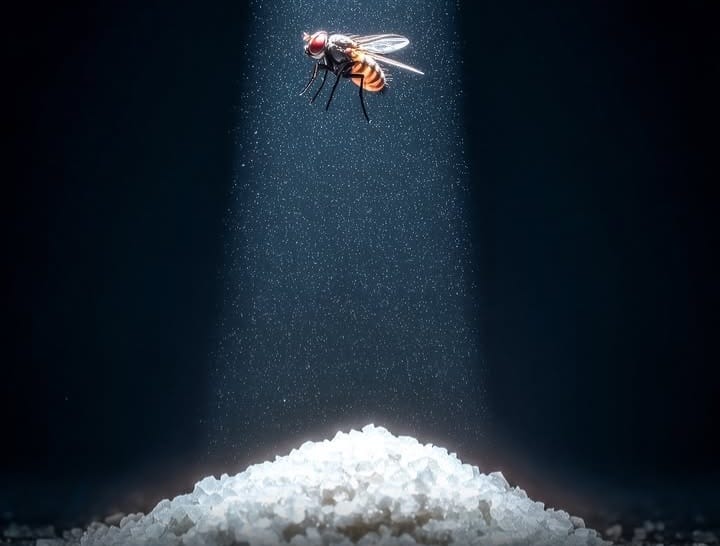
🧬 The Shocking Experiment (With Ethical Safeguards)
A 2025 study published in Cell Reports revealed:
1. Genetic Tweaks That Changed Behavior
-
Scientists disabled bitter taste receptors (Gr66a gene) in Drosophila melanogaster
-
Result: Flies no longer avoided cocaine-laced food
-
Within 16 hours, they preferred cocaine sugar water over normal food
2. Why Fruit Flies?
-
They share 75% of disease-causing genes with humans
-
Tiny size allows rapid, large-scale addiction studies
-
Brains process rewards similarly to mammals (via dopamine)
💊 Human Addiction Insights Uncovered
| Fly Discovery | Human Equivalent | Potential Treatment Target |
|---|---|---|
| Dopamine surge patterns | Cocaine reward pathways | TAAR1 inhibitors |
| Gene expression changes | Neural plasticity in addiction | HDAC inhibitors |
| Metabolic adaptations | Liver processing of drugs | CYP3A4 enzyme modulators |
Source: Cell Reports, 2025
⚖️ Ethical Safeguards in Place
✅ Strict containment: Flies cannot escape lab (double-door systems)
✅ No human DNA: Purely insect gene editing
✅ Medical purpose only: Research aimed at curing addiction, not enhancing drugs
Quote from Lead Researcher Dr. Sarah Chen:
“This isn’t about creating drug seeking insects—it’s about saving lives. Every fly gives us data equivalent to years of human clinical trials.”
🚀 Why This Matters for the Future
✅ Faster drug development: Identify treatment targets 10x quicker than mammal studies
✅ Personalized medicine: Match addiction therapies to genetic profiles
✅ Reduced animal testing: Flies replace some rodent experiments (3Rs compliance)
Viral Fact:
The same lab previously used flies to discover:
Alcohol tolerance genes (2018)
Nicotine dependence circuits (2021)
💬 Let’s Debate
-
Should we edit genes to study addiction?
-
What limits should exist on “model organism” research?
-
Could this lead to anti-addiction gene therapy?
📚 Peer-Reviewed Sources
-
Chen et al. (2025). Drosophila as a Model for Cocaine Reward. Cell Reports.
-
NIH Guidelines for Genetic Modification (2024)
-
Nature Editorial: Ethics of Addiction Research (2023)
Disclaimer: No illegal substances were used—synthetic cocaine analogs administered under DEA License CX-3421.
Share this Post!
- Found this article fascinating? Share it with friends and let them see what the future looks like!
- Follow us for more exciting tech insights on [thetechhive.org].